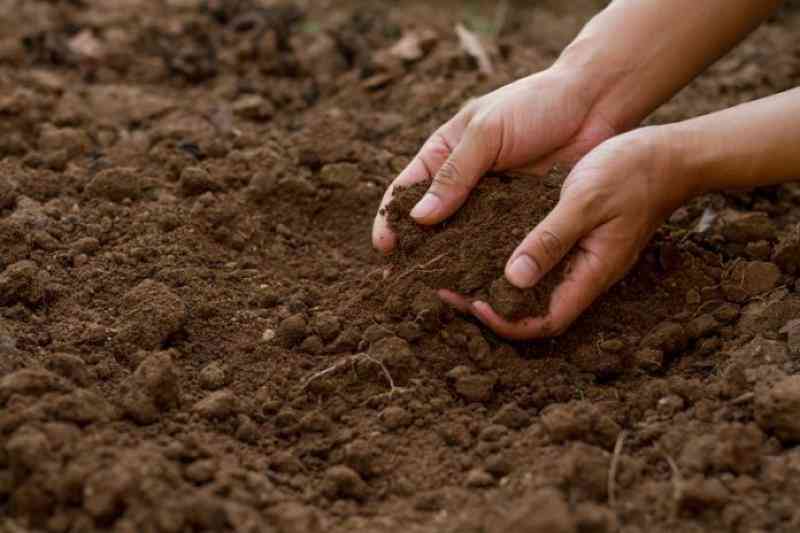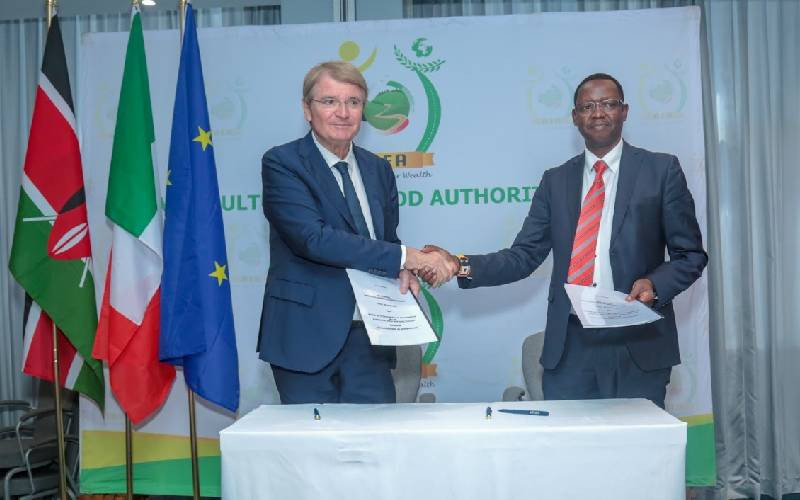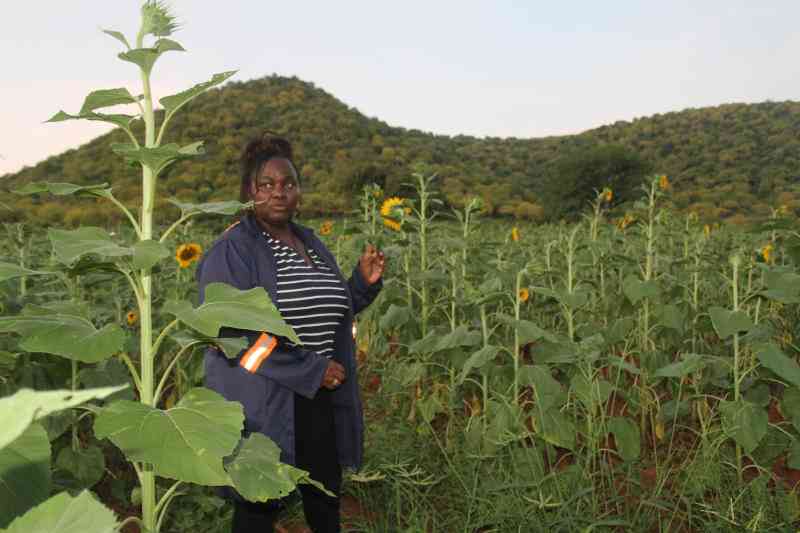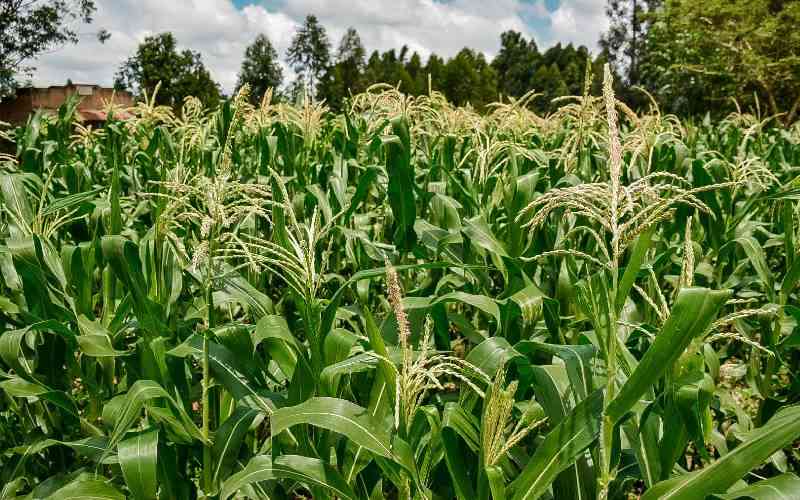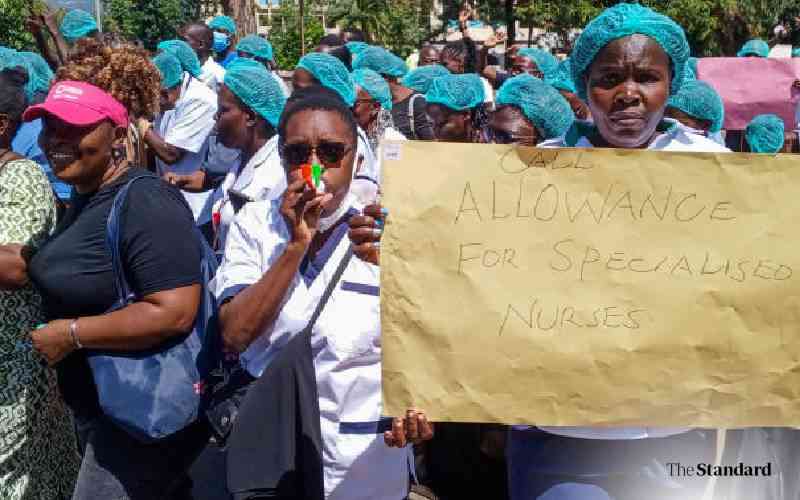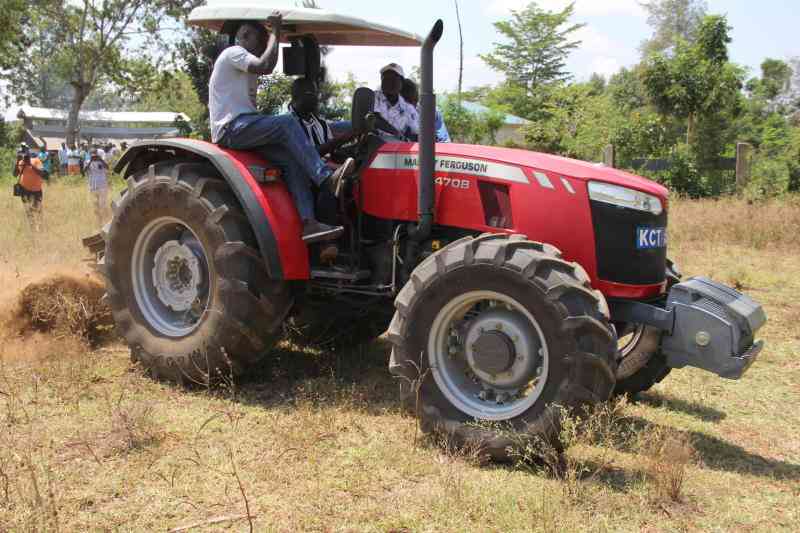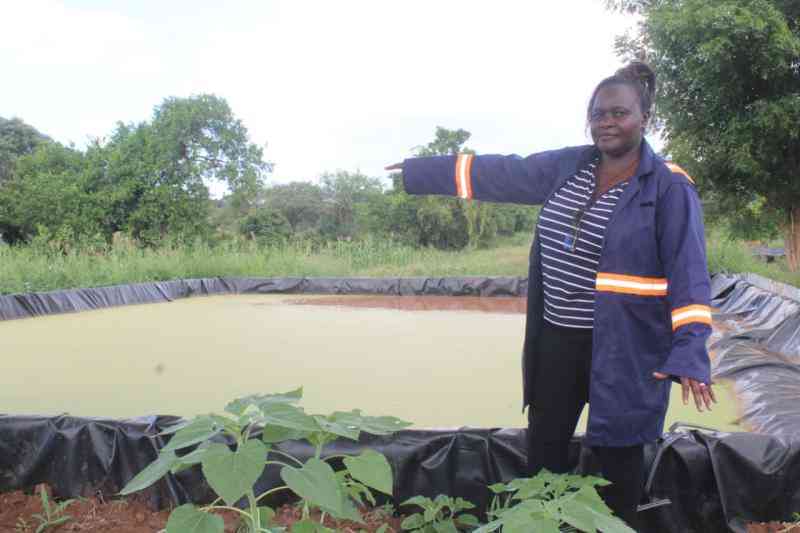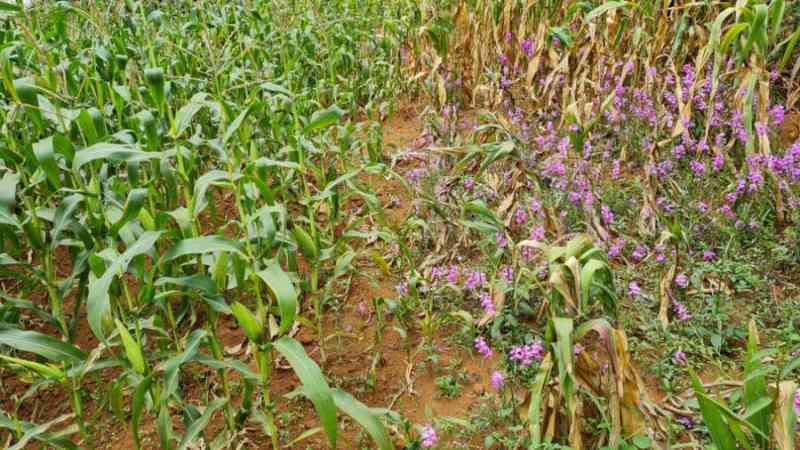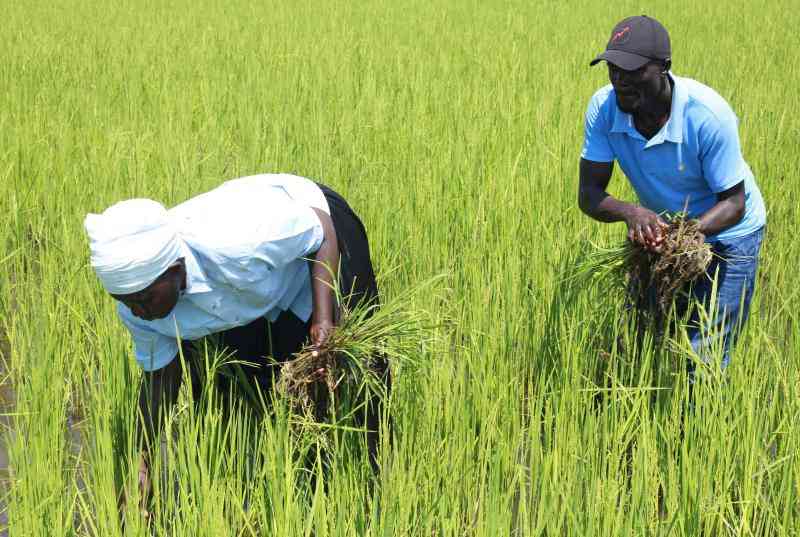
A small scale farmer Mr Hiti Kamau attending plants in his farm in Kahiga village in Kandara. [Boniface Gikandi, Standard]
Over the past two decades, African leaders have made significant strides toward transforming their food systems. The Maputo and Malabo declarations set bold goals for agricultural transformation in Africa, but progress toward these goals has been slow. The recent implementation of the African Continental Free Trade Area (AfCFTA) represents an opportunity to remove trade barriers and strengthen intra-regional trade, thus providing farmers and all other stakeholders along food systems value chains a strong incentivize to increase local production and transform food systems. However, with at least one in five Africans going hungry and the population expected to reach two billion by 2050, urgent action is needed to ensure access to nutritious and enough food for all. However, financing food systems remains the main challenge.
In June, stakeholders from around the world met at the Summit for a New Global Financing Pact in Paris, held in response to a radical call led by African leaders and Barbados Prime Minister Mia Mottley to rethink and restructure the global financial system and boost financial support for developing countries grappling with excessive debt, climate change and poverty. With the issue of debt servicing high on the summit's agenda, the World Bank agreed to pause debt repayments for countries hit by extreme climate events (only for new loans, not existing ones). Zambia also reached an agreement with its official bilateral creditors to restructure $6.3 billion of its bilateral debt, a little over a third of its total public external debt of more than $18 billion (Tran 2023). Though insufficient to reduce Zambia's debt load significantly, the agreement enables its government to access a $188 million-disbursement from its $1.3 billion IMF program. For the 21 countries in Africa in, or at risk of, debt distress, reducing their debt burden is urgent and crucial to regain fiscal space for meaningful investment in their agriculture sector, the backbone of many African economies, and food systems in general.
Other important announcements during the summit related to multilateral funding include the IMF's positive progress on meeting the required US$100 billion commitments for the recycling of Special Drawing Rights (SDRs), which would provide much-needed liquidity to African countries, as well as the World Bank and other multilateral development banks' plans to make an additional US$200 billion in loans available within five years. This goes to show that it is worth maintaining pressure on governments and international organizations to deliver on their commitments and pledges (Tran 2023).
Also at the June summit, Senegal signed its fourth Just Energy Transition Partnership (JETP) deal, this time with countries of the G7, which will provide an initial US$2.74 billion in finance for renewable energy projects. The deal represents another major step in harnessing our continent's clean energy potential, which can be used to power the transition to sustainable food systems. In the lead-up to the summit, momentum was also made on the call for a seat for the African Union at the G20.
The Global Stocktake and food systems
Countries around the world are engaging in the first-ever Global Stocktake of the Paris Agreement, aimed at reviewing progress towards critical climate goals. The global stocktake is scheduled to conclude at the UN Climate Change Conference (COP28) at the end of this year. It will come as no surprise that the world, including most countries in Africa, still have a very long way to go to achieve the goals of the Paris Agreement, especially in relation to emission cuts, adaptation and mitigation, and coming through with financing for developing countries.
In the meantime, another important global stocktaking moment will be held - this time with a clear focus on food systems. From July 24-26 of this year, the 2023 UN Food Systems Stocktaking Moment will be held in Rome, Italy, as follow-up to the 2021 UN Food Systems Summit. Convened by the UN Secretary General, this meeting aims to "create a conducive space for countries to review commitments to action that were made during the Summit, share stories of success and early signs of transformation, maintain the momentum for bold acceleration and bold action to further the resilience of food systems" (FAO, n/d). The UN Food Systems Coordination Hub has developed a template that countries can use to assess progress on their commitments and in their food systems. This will undoubtedly be a very useful tool for the strategic planning of action on food systems in our region.
- Redesign clean energy funding, African Ministers demand
Keep Reading
If we play things right here in Africa, we can capitalize on the processes of reviewing the aforementioned declarations and commitments to quicken the pace of Africa's food systems transformation. It is well-known that the agriculture and food sectors are among the greatest contributors to GHG emissions. Yet, it is also true that adequate investments in the transition to truly sustainable, resilient and inclusive food systems would turn agriculture into a key solution. In fact, without this transition, meeting many global goals and targets will be impossible. Hence the importance of maintaining the pressure on developed countries to make good on their promises to transfer to developing countries the resources they need to sustainably increase the production and supply of food to their rapidly growing population.
Indeed, in Africa, we have just recently witnessed how quickly things can worsen amidst shocks. The COVID-19 pandemic and the ongoing conflict between Russia and Ukraine highlights the vulnerability of Africa's food systems to external shocks. Fertilizer prices have tripled in some African countries on account of the conflict, affecting the costs of food production, while global inflation has led to rising food prices, especially, but not exclusively, those for imported food. This adds to the annual US$35 billion food bill that puts even more strain on African countries' foreign exchange reserves and diverts much-needed resources away from investing in the region's food systems.
The African context is, therefore, marked by paradoxes: food insecurity is on the rise in the region despite millions of hectares of fertile, uncultivated land. The explanation for this quite complex, as the reality on the ground varies greatly from one country or even one subregion to the next, but common obstacles that African farmers and countries face are high levels of vulnerability to climate variability and events and adverse growing conditions; under-investment in or under-capitalization of technology and innovation, information and infrastructure; fractured markets, and a general lack of capacity to address key risks posed by climate change, among others. Yet, the technology and knowledge to improve land-use efficiency and productivity levels are already there: for instance, in a region where the vast majority of farmers depend on rainfall, the implementation of efficient irrigation systems can boost land-use efficiency and agricultural productivity by as much as 50%. Even so, the severe lack of access to financing prevents farmers, MSMEs and governments from taking advantage of a myriad of unexploited opportunities for investments and innovation - yet another paradoxical situation plaguing the continent.
Therefore, African governments and the private sector must urgently establish policies that address the weak linkages between food systems and the financial sector to accelerate public and private investments on productive, nutritious, inclusive and climate-resilient food systems. Creativity and innovation are, in fact, key to sustainably transforming our food systems into ones capable of feeding the continent sustainably and creating decent job opportunities for our vibrant youth and women.
Against this backdrop, the upcoming Africa Food Systems Forum 2023 Summit, to be held in early September in Dar Es Salaam, Tanzania, offers a timely opportunity to take stock of progress on food systems transformation in Africa and re-set the continental agenda ahead of COP 28.
From September 4-8th, the summit will bring together leading experts, businesses and delegates from all across Africa to assess the state of affairs in Africa's agri-food and agriculture sectors and, together, define decisive strategies and urgent actions to enable the continent to recover and rebuild its food systems.
As the theme of the 2023 summit "Regenerate, Recover, Act: Africa's Solutions to Food Systems Transformation" suggests, the goal is to ensure the African continent continues to assume its leadership role in food system recovery and transformation. The summit will be a space for showcasing the latest African solutions, innovations and best practices, including technologies for the regeneration of natural resources. The summit will serve as a convening platform to promote the production of sufficient, locally sourced and more nutritious food while improving how it is produced, particularly in a changing climate.
One highlight of this year's summit will be the participation of women and youth in food system transformation, with a focus on their engagement in the stocktaking of progress and the establishment of new partnerships to fast-track objectives. In sub-Saharan Africa, women contribute an average of 40 percent of the labour in crop production, which underscores the importance of their role in the agriculture sector and food systems. However, to fully recognize and strengthen women's place and contribution to food and agriculture, their access to resources, knowledge, training, business opportunities and markets must be urgently and greatly improved. Furthermore, as Africa is a continent of young people, with 60 percent of the population under 24 years of age and around 12 million young people joining the workforce each year, there is significant opportunity to harness the energy, creativity and innovative spirit of youth to transform the continent's food systems. These are the underpinnings of successful national programmes, such as Tanzania's Building a Better Tomorrow - Youth Initiative for Agribusiness (BBT-YIA) project. The BBT-YIA initiative prioritizes investments in education, training and access to financial and non-financial resources for women and youth, empowering them to become the driving force behind sustainable and inclusive agricultural growth in Africa.
Also at this year's summit, the Agribusiness Dealroom will expand on its legacy of linking entrepreneurs and governments to investors, funds and technical service providers and providing funding and technical support for the advancement of innovation and national transformation plans.
This year's summit promises to be a critical milestone in Africa's journey toward food security and shared prosperity. I hope you will join us for this exciting moment in the region's quest for solutions to accelerate Africa's food system transformation.
The author is the Managing Director for Africa's Food Systems Forum - AGRF
 The Standard Group Plc is a multi-media organization with investments in media platforms spanning newspaper print
operations, television, radio broadcasting, digital and online services. The Standard Group is recognized as a
leading multi-media house in Kenya with a key influence in matters of national and international interest.
The Standard Group Plc is a multi-media organization with investments in media platforms spanning newspaper print
operations, television, radio broadcasting, digital and online services. The Standard Group is recognized as a
leading multi-media house in Kenya with a key influence in matters of national and international interest.


